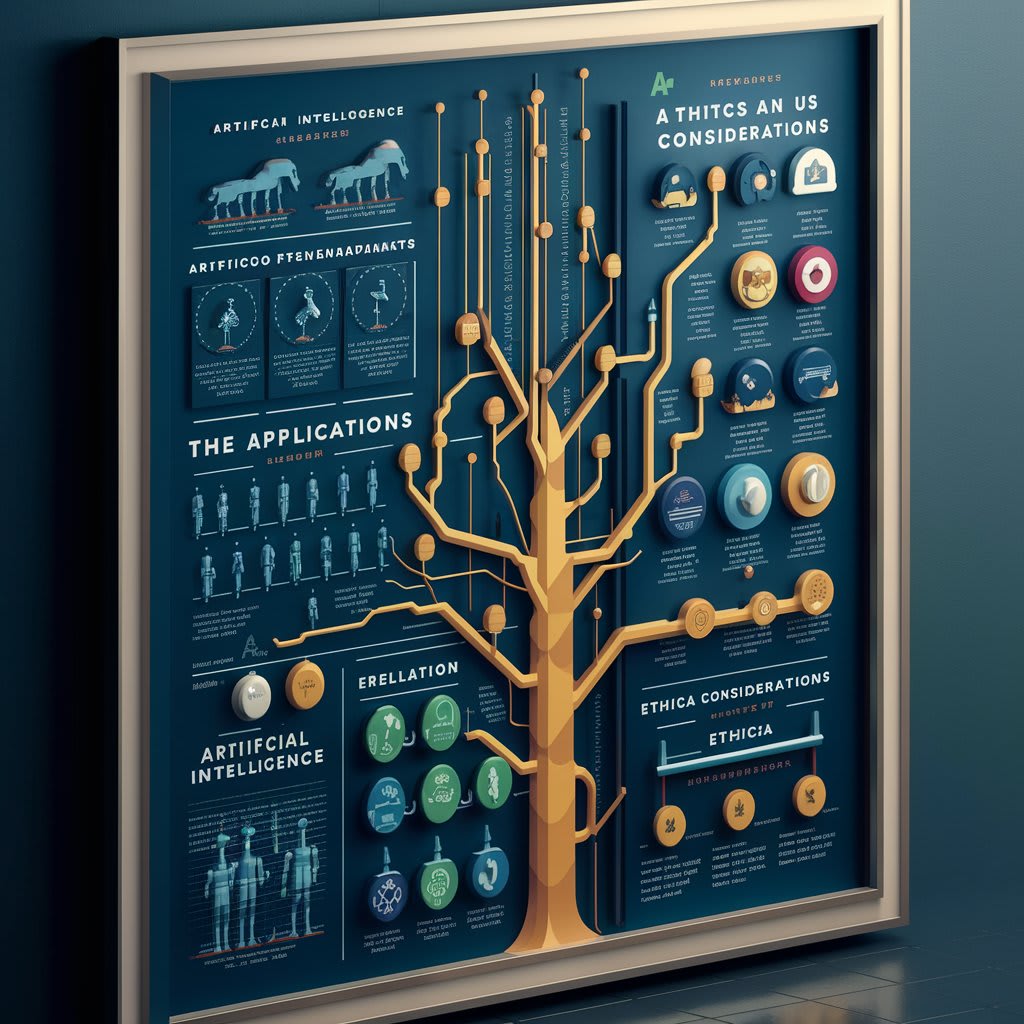
Introduction:
Artificial Intelligence (AI) represents one of the most transformative technologies of the 21st century, reshaping industries, economies, and societies worldwide. Its journey from theoretical concepts to practical applications has been marked by significant milestones, with profound implications for the future of humanity. In this comprehensive discourse, we delve into the evolutionary trajectory of AI, its diverse applications across various sectors, and the ethical considerations essential for its responsible development and deployment.
Part 1: Historical Perspectives of Artificial Intelligence
The conceptual origins of AI can be traced back to the mid-20th century, when pioneering researchers laid the groundwork for creating intelligent machines. Alan Turing's seminal work on computability and the Turing Test provided theoretical foundations for exploring the capabilities of artificial intelligence. The Dartmouth Conference of 1956, organized by John McCarthy and others, marked the formal birth of AI as an interdisciplinary field, setting ambitious goals for creating machines capable of human-like reasoning, learning, and problem-solving.
Part 2: Technological Advancements in Artificial Intelligence
The evolution of AI has been propelled by exponential growth in computing power, data availability, and algorithmic sophistication. From early symbolic AI and expert systems to modern machine learning algorithms and deep neural networks, AI technologies have undergone rapid advancement. Breakthroughs in natural language processing, computer vision, and robotics have enabled AI systems to perform tasks once thought to be exclusive to human intelligence. Applications of AI span diverse domains, including healthcare, finance, transportation, agriculture, and beyond, driving innovation and transforming industries.
Part 3: Impact of Artificial Intelligence on Society
The societal impact of AI is profound and multifaceted, encompassing economic, social, and ethical dimensions. On the one hand, AI holds the promise of unlocking new opportunities for productivity gains, cost savings, and scientific discovery. However, concerns persist regarding job displacement, economic inequality, and algorithmic bias. Ethical considerations surrounding data privacy, algorithmic transparency, and autonomous decision-making are central to ensuring that AI technologies align with human values and promote societal well-being.
Part 4: Ethical Considerations and Future Directions
Addressing ethical considerations is paramount in guiding the responsible development and deployment of AI technologies. Transparency, accountability, fairness, and privacy must be prioritized to mitigate the risks of unintended consequences and societal harm. Regulatory frameworks, ethical guidelines, and industry standards are essential tools for promoting the responsible use of AI. Moreover, interdisciplinary collaboration among technologists, policymakers, ethicists, and stakeholders is crucial for navigating the complex ethical dilemmas posed by AI and fostering trust in intelligent systems.
Part 5: Societal Adoption and Challenges of Artificial Intelligence
The adoption of AI technologies across various sectors has accelerated in recent years, driven by advancements in computing, data analytics, and connectivity. Industries such as healthcare, finance, manufacturing, and transportation have embraced AI to enhance efficiency, improve decision-making, and deliver personalized experiences. However, the widespread adoption of AI also presents challenges, including concerns about job displacement, ethical implications, and societal acceptance. Addressing these challenges requires a holistic approach that balances technological innovation with social responsibility and human-centric design.
Part 6: Ethical Considerations in AI Development and Deployment
Ethical considerations are integral to the development and deployment of AI systems, guiding decisions about algorithmic design, data usage, and societal impact. Key ethical principles include fairness, transparency, accountability, and privacy. Ensuring fairness in AI requires mitigating biases in data and algorithms to prevent discrimination and promote equity. Transparency involves providing users with insights into how AI systems operate and make decisions, fostering trust and understanding. Accountability entails establishing mechanisms for oversight and recourse in cases of AI-related errors or harm. Protecting privacy rights is essential to safeguarding individuals' personal data and autonomy in an increasingly data-driven world.
Part 7: AI Governance and Regulation
Effective governance and regulation are essential for ensuring that AI technologies are developed and deployed responsibly. Governments, industry stakeholders, and civil society organizations play crucial roles in shaping AI policies and standards. Regulatory frameworks should address issues such as data protection, algorithmic accountability, and liability for AI-related outcomes. International collaboration is also needed to harmonize AI regulations and promote global standards for ethical AI development and deployment. Moreover, ongoing dialogue between policymakers, technologists, ethicists, and other stakeholders is essential for navigating the complex and rapidly evolving landscape of AI governance.
Part 8: Addressing AI Bias and Fairness
One of the most pressing challenges in AI development is the presence of bias, which can lead to unfair or discriminatory outcomes. Bias can be introduced at various stages of the AI lifecycle, including data collection, algorithm design, and model training. Addressing bias requires a multi-faceted approach that involves diversity in data collection, transparency in algorithmic decision-making, and continuous monitoring and mitigation of bias in AI systems. Fairness-aware machine learning techniques, such as fairness constraints and bias mitigation algorithms, are being developed to promote fairness and mitigate bias in AI applications. Moreover, interdisciplinary collaborations between computer scientists, ethicists, social scientists, and domain experts are essential for understanding and addressing the complex socio-technical issues surrounding AI bias and fairness.
Part 9: AI and Employment Dynamics
The widespread adoption of AI technologies has raised concerns about the future of work and employment dynamics. While AI has the potential to automate routine tasks and augment human capabilities, it may also lead to job displacement and changes in the labor market. Proactive measures, such as reskilling and upskilling programs, lifelong learning initiatives, and job transition support, are needed to mitigate the potential negative impacts of AI on employment. Moreover, fostering a culture of innovation and entrepreneurship can create new job opportunities and stimulate economic growth in AI-enabled industries. By embracing AI as a tool for augmenting human intelligence and productivity, rather than a replacement for human labor, we can ensure a more inclusive and equitable future of work.
Part 10: The Future of Artificial Intelligence
Looking ahead, the future of artificial intelligence promises continued innovation and transformative impact across all sectors of society. Advances in AI technologies, such as reinforcement learning, quantum computing, and neuromorphic computing, hold the potential to unlock new frontiers in AI research and applications. Ethical AI principles, including transparency, fairness, accountability, and privacy, will remain paramount as AI becomes increasingly integrated into our daily lives. Moreover, ongoing dialogue and collaboration between stakeholders from diverse backgrounds will be essential for shaping the direction of AI development and ensuring that AI serves the best interests of humanity.
Conclusion:
Artificial Intelligence represents a powerful tool for addressing complex challenges and unlocking new opportunities for human progress. However, realizing the full potential of AI requires a commitment to ethical principles, responsible governance, and inclusive innovation. By embracing diversity, fostering transparency, and prioritizing human values, we can harness the transformative power of AI to create a more sustainable, equitable, and prosperous future for all. As we continue to navigate the evolving landscape of AI, let us remain steadfast in our dedication to shaping AI technologies for the benefit of humanity.
About the Creator
Enjoyed the story? Support the Creator.
Subscribe for free to receive all their stories in your feed. You could also pledge your support or give them a one-off tip, letting them know you appreciate their work.






Comments
There are no comments for this story
Be the first to respond and start the conversation.